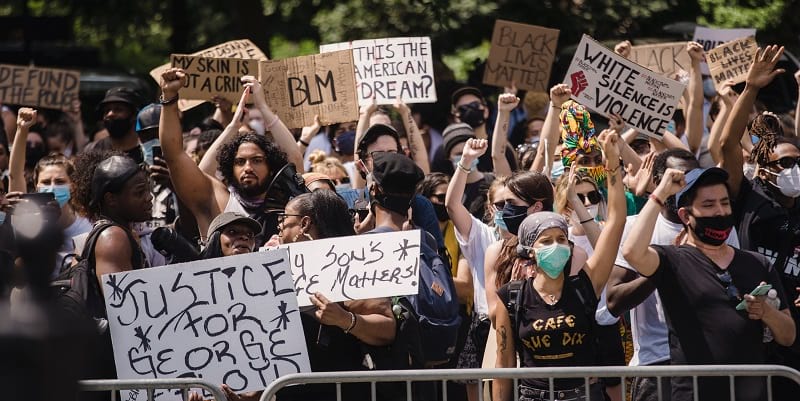Liberalism: the Definition and Theory explained

Liberalism: This article explains liberalism in a practical way. Next to what it is (definition and origins), this article also highlights the two treatises, the separation of church and state, welfare state and liberal thinking and keynesian economic views. After reading you will understand the basics of this political and social movement. Enjoy reading!
What is Liberalism?
The definition of liberalism
Liberalism is a moral and political movement and philosophy based on individual rights, liberty, equality before the law and popular consent.
Liberals share a wide range of views, for example about:
- Civil rights
- Human rights
- Liberal democracy
- Secularism
- Economic freedom
- Political freedom
- Freedom of speech
- Freedom of the press
- Freedom of religion
- Private ownership
- Market economy
Most of these views are diametrically opposed to the views of fascism.
Origins of liberalism
Classical liberalism became a distinct political movement during the Age of Enlightenment. It gained popularity among well-known Western philosophers and economists. Liberalism is the reason that state religion and absolute monarchy were replaced by a representative monarchy and the rule of law.
The rise of liberalism also marked the end of mercantilist policies, royal monopolies and other trade arrangements.
Philosopher John Locke is often credited as the father and founder of liberalism. Liberalism looked slightly different in different countries. British liberals mainly emphasized on expanding democracy, while French liberalism mainly emphasized on rejecting authoritarian political policies.
Thomas Hobbes, another British philosopher, constructed the idea of a social contract that individuals enter into with the state to ensure their security. This concept of a social contract was then widely adopted to describe the relationship between state and people.
The social contract means, among other things, that citizens surrender part of their individual rights to regulate and mitigate social interactions, or to mediate in conflicts and enforce justice.
Hobbes argued for a strong monarchical commonwealth, a voluntary alliance of 54 states. On the contrary, Locke argued for the then radical idea that the government gets permission from the governed. That permission must be constantly present for the government to remain legitimate. He argues that when a monarch becomes a tyrant, it is a violation of the social contract that exists between the state and the people. He concluded that the people have the right to overthrow a tyrant.
Liberalism: two Treatises
John Locke described his vision in Two Treatises, from 1690. This became the foundation of liberal ideology. Here he described that when people left their natural state and started societies, a political society began. This political society needs the consent of free people in that state to unite in a government.
The strict view that a legitimate government should not be above the law and may even be overthrown was a major break with existing theories of power and governance at the time. One political scientist described this view as: “according to the liberal view, there are no citizens within a regime who can claim to rule by natural or supernatural law without the consent of the governed.”
Introduction to Political Science with a Concentration on Political Ideologies
Opponents of John Locke
Besides Hobbes, Locke had several other intellectual opponents. In the First Treatise, Locke targeted the arguments of the founder of conservative philosophy, Robert Filmer.
Filmer argued for the divine right of kings by appealing to the Bible. He claimed that the authority given to Adam by God gave successors to Adam the right to rule over other creatures in the world.
Locke disagreed with Filmer so much that the First Treatise was almost entirely devoted to disproving these arguments. According to Locke, his respect for consensus was only strengthened and he argued that a conjugal society is formed by a voluntary agreement between men and women.
Locke claimed that the rulership in Genesis was not with men over women, but with men over animals. He was not a great feminist thinker, but Locke paved the way for a pluralistic world. He integrated the role of women in social theory.
The main political and ideological opponents of liberalism around 1920 were communism, conservatism and socialism. The movement was clearly challenged and tested as it faced gigantic ideological challenges from Fascism and Marxism.
In the twentieth century, liberal ideas spread further, especially in Western Europe. Today, many states have liberal governments, such as the Netherlands, where the largest party in the government is the People’s Party for Freedom and Democracy (VVD – Volkspartij voor Vrijheid en Democratie), led by Mark Rutte.
Separation of church and state
John Locke also elaborated on the concept of the separation of church and state. Montesquieu wrote in 1721 about religious tolerance and a separation between religion and government.
Voltaire championed some degree of separation between the two, but in the end the church was subordinated to the needs of the state as a whole. Denis Diderot said: the distance between the throne and the altar can never be great enough.
Based on the principle of the social contract, Locke argued that the government had no authority at all over human conscience because people cannot control it. According to Locke, this meant a natural right to freedom of conscience. This freedom of conscience had to be protected against any form of government institutions.
Welfare state and liberal thinking
In North America and Europe, liberalism became a core aspect of expanding the welfare state. Many western countries today have a social system rooted in liberalism. In its early stages, liberalism popularized economic individualism and promoted a constitutional government.
The liberals sought a constitutional order, which included the most important freedoms:
- Freedom of speech
- Freedom of association
- Independent judiciary
- Abolition of aristocratic privileges
- Public jury trial
- Gender equality
- Racial equality
- Right to vote
- Universal access to education
Liberal economic theory
In The Wealth of Nations, economist Adam Smith takes a closer look at the motivation for economic activity and the policies the state should adopt to maximize wealth. Adam Smith wrote that as long as supply, demand and prices remained free from government regulation, as well as competition, the wealth within a society would maximize through the effect of the free market.
A so-called “invisible hand” would direct individuals and companies to work for the good of the nation as an unintended consequence of the pursuit of personal success and prosperity. This view is a moral justification for the accumulation of great wealth, previously regarded as evil and sinful.
Adam Smith further states that workers can be paid so low that they can barely survive. This idea was later transformed into the “iron law of wages”. Smith’s emphasis was on the benefit and wealth that would be gained through free and international trade.
He further thought that wealth could be increased by specializing in production. He opposed subsidies, trade unions and employers’ organizations. According to him, the government should limit itself to defense, public affairs and administration of justice. All this must be financed with income-based taxes.
Keynesian economic views
Another influential economist is John Maynard Keynes. He is still regarded as the founder of modern liberal economic policy.
The Keynesian Revolution emerged during periods of global economic hardship. During the Great Depression, John Maynard Keynes provided the definitive answer of liberal views on the economic crisis.
Keynes was particularly critical of the British government’s austerity measures during the Great Depression. He believed that budget deficits were a good thing. He wrote: “For Government borrowing of one kind or another is nature’s remedy, so to speak, for preventing business losses from being, in so severe a slump as to present one, so great as to bring production altogether to a standstill.”
Protecting individual freedoms
What is especially troubling to liberals is territorial expansion or imperialism. That’s when states try to build wealth by conquering territory. Not only do these expansionist wars strengthen the state at the expense of the people, wars also require long-term commitment to military occupation and political control of foreign territory. Occupation and control require a great deal of bureaucracy.
For liberals, therefore, the core challenge is to develop a political system that is able to protect itself from foreign threats without undermining the most important individual freedoms of citizens.
The main checks on power are fair elections that allow the people to choose or remove their rulers. A second check on too much political power is the use of different levels of government and branches, such as a parliament or congress and a well-functioning legal system.
Now It’s Your Turn
What do you think? Do you recognize the explanation about liberalism? What differences do you see with, for example, fascism? Do you recognize the liberal influences with which Western countries are governed? What do you think is the best way to organize a society? Do you have any tips or remarks?
Share your experience and knowledge in the comments box below.
More information
- Seliger, M. (2019). The liberal politics of John Locke. Routledge.
- Gray, J. (2014). Post-liberalism: Studies in political thought. Routledge.
- Paskhaver, A. (2021). Introduction to Political Science – with a Concentration on Political Ideologies. Retrieved 02/12/2024 from Udemy.
- Smith, A. (1937). The wealth of nations [1776] (Vol. 11937). na.
How to cite this article:
Janse, B. (2022). Liberalism. Retrieved [insert date] from Toolshero: https://www.toolshero.com/sociology/liberalism/
Original publication date: 09/29/2022 | Last update: 02/13/2024
Add a link to this page on your website:
<a href=”https://www.toolshero.com/sociology/liberalism/”>Toolshero: Liberalism</a>












